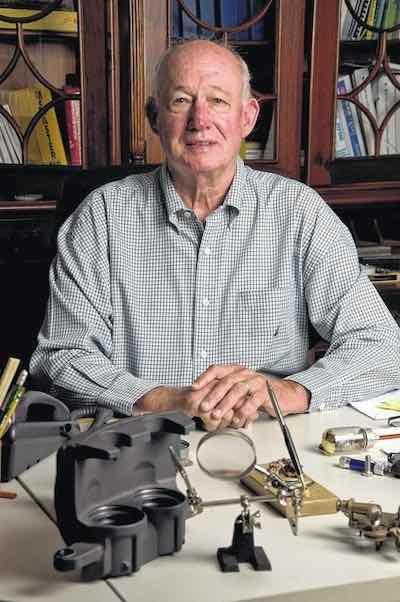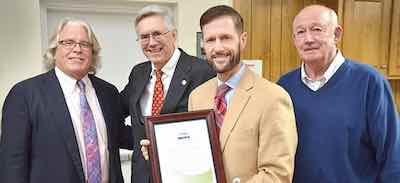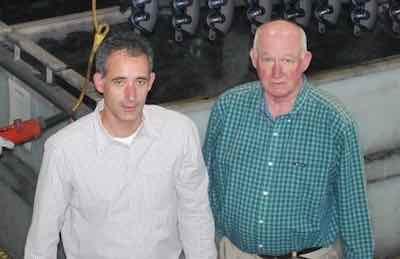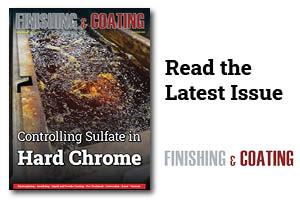John Cutchin started Palmetto Plating in Easley, SC, in 1964 to provide metal finishing services to the textile industries, which were located in the upstate region of South Carolina.
Cutchin became interested in electropolishing while taking chemistry during his junior year of high school. After winning second prize at a regional science fair held at Furman University, Cutchin bought a bronzing kit for $50 and began bronzing baby shoes and other items for the community. Shortly thereafter, Cutchin incorporated Palmetto Plating.
Palmetto Plating also works with numerous clients in the aerospace industry and has received international accreditation for its quality management systems under the Aerospace Registration Management Program.
Visit https://palmettoplating.com
Tim Pennington: John, take us back to the beginning of what was the start of Palmetto Plating; I know this goes back to the 1950s.
John Cutchin: That's correct. Yes. When I was a junior in high school, I worked for a metal machining and fabrication company, and we did work at a local textile machinery manufacturer. We did work in their plating room. And became familiar with some of the people there who were influential. One of them was Homer Massey, who ran it, and the other was Don Roy, who you probably know as the founder of Roy Metal Finishing. Don was a crusty old New Englander, but I always considered him a good friend. While there, I became interested in chemistry. Later, in the 11th grade, I had a good chemistry teacher who was also our football coach and eventually the mayor of our small city. And he encouraged me to go into chemical engineering. So, for one of my high school chemistry projects, I did an electroplating of copper and won first prize in the state contest. Then I started plating baby shoes as a side business. I was 18 years old when I did it. After that, I went to the University of Georgia for one year in a program with Georgia Tech. They dropped the program after that, so I transferred to Clemson and went for two semesters. In the second semester, I didn't finish, I dropped out, and incorporated Palmetto Plating Company in 1964.
Q: It seems like you had a real love and interest in the sciences; what, but what got you into electroplating? What made you really think that this was such an interesting career that you wanted to pursue it in college?
JC: It involved organic chemistry, which was my preferred area of study. I didn't care to go to work in an oil field, Exxon, or Gulf Oil. And I enjoyed the results; It was just fascinating work. At that time, in the south, where we lived in the northwestern part of South Carolina, the textile industry was predominant. Basically, you worked in a textile plant, or you sold equipment to them, or you furnished machining. Our initial work was copper plating of drop wires, which were used on loons. And we did that for about a little bit over two years, three years. And then after I dropped out of Clemson, my name went to the top of the draft list, and so I had to go spend a little bit of time with Uncle Sam. Did that right after I was married and went to Fort Campbell, then Fort Sill, and finally came back, and I'd had my first child at that point and really decided that plating drop wires wasn't for us. We would be better off getting into general metal finishing. So we started hard chrome plating, and our customers were predominantly in the textile machinery industry.
 Q: Did you have any partners? How did you get all that going for yourself?
Q: Did you have any partners? How did you get all that going for yourself?
JC: I had one partner who was my high school chemistry coach and football coach. And I bought him out after three months. So I've been on my own ever since. Looking back, it was probably a big mistake, but that's life. I've enjoyed it. Still coming to work every day. When I became the owner, I was too young to buy a beer or to vote in South Carolina. I was 20 years old.
Q: How was it for you back in those early days?
JC: At that time, to sell metal finishing to the textile industry, you basically had to travel a lot to the various plants. And they had a system of purchasing and management, with everything going through the purchasing management. I had a salesman who handled that portion, and we've always worked with a dedicated salesperson —not manufacturers or reps —and still do to this day. I think it's very important that our customers have someone they can call directly and interact with to keep them away from me and prevent me from making a mistake.
Q: Running a finishing operation and plating operation in the 1960s and 1070s, were the regulations as deep as they are today? How was it back then?
JC: They did not exist at that time. There was no Environmental Protection Agency that came in. Before that, you answered the local POTW.
Q: Were there any types of industries that you went after?
JC: About that time, more industries started moving into South Carolina. Probably the one issue that helped more than anything was when Michelin made this their North American headquarters. Following Michelin, the BMW plant was established and still exists. Both industries exist today, and there was a lot of supporting industry that came in with those two gotchas. South Carolina's been very aggressive in soliciting industries that choose to move from the north. We branched out for a while into zinc plating, but it wasn't my thing. We now specialize more in hard chrome, anodizing, and finishing of stainless steel.
Q: Who were some of your mentors?
JC: Ben Deal was always a big source. Ben was with Jackson Lee and later with the 3M, always on call to help us immensely. A lot of the vendors we had that called on supplied metal finishing products and were very instrumental. We gained a lot of information from them and still do, which shows we value our relationship. We don't change vendors without a big reason; we pride ourselves on our loyalty to them and learn a lot from them. Also, the association with the National Association of Surface Finishers has been important. And before that, the American Electroplating Society was very important and played a key role. I mentioned Don Roy; we were somewhat competitors, but I could always call on him, and he was very helpful. Luke Walker, who started Roll Technology, was a big influence on my life. I've been lucky that people have let me bend their ear, and we tried to do our best and take their advice.
 John Cutchin, far right, is actively involed in his local community in Easley, SC.Q: I know that later in your career, you've paid it back a little bit. I know you have done some things with the local school district and their science programs. Tell us about that and how you got involved in them.
John Cutchin, far right, is actively involed in his local community in Easley, SC.Q: I know that later in your career, you've paid it back a little bit. I know you have done some things with the local school district and their science programs. Tell us about that and how you got involved in them.
JC: We pride ourselves on having interns that we try to get from the local schools, usually from the high school. We ask to see if there's anybody who is an incoming junior who has an interest in chemistry, and we offer them employment at hours they decide. They have worked in the lab, and we've probably had 30 or 40 interns. Right now, we have two students, both of whom are graduating from high school; the other one has already graduated. Our laboratory manager was an intern. He went to a local college, earned his degree in chemistry, and now manages our laboratory. We are proud of that association. We also offer a scholarship to the best science student of the local high schools as well as the junior high schools. Been doing that for about 30 years and really enjoy meeting those students and keeping track of how they progress through college and into their careers.
Q: I know you've got Hunter and Stacy running it now. How long have they been there, running everything for you then?
JC: Hunter's been working here since he was in high school. And he's 50-some years old now. Stacy has been with us for about 20 years. She's now a part owner, and I've stepped away. Hunter is now the president and has a lot of good ideas. I'll tell you, it's not easy being a father and having your son work with you; you want to keep thinking that they're still kids, but it's taken me a long time to realize that I need to step away. I come in every morning at 7:30, and it gives me something to do. Originally, when I started the company, we didn't have a computer. We didn't enter work orders. As work came in, we completed it and shipped it on the line. We didn't have a computer; you had to use the typewriter. We typed the bill in the packing list and the invoice. And then hopefully got the check, put it in the bank, and cleaned the restrooms on the weekend, along with whatever else we needed to do.
Q: How have you developed your management style?
JC: I'll tell you a little short story. Years ago, probably, maybe 40 years ago, I had a man who had retired. He was a truck driver for a textile company. Drove a tractor-trailer, and he retired, and his brother worked for me as a polisher and buffer, and his name was Calvin Bowens. Calvin wanted to work with us, so he came to work part-time. I had a boat on the local lake at the time. I was having some work done on it. It was about a 30- 35 foot boat, and it was on the back of a trailer. So I asked him, I said, “Calvin, would you go down and help me put this boat in the water this weekend?” He was very accommodating, driving the truck while I was out behind it, giving all kinds of hand signals and barking directions. Suddenly, it occurred to me that he wasn't paying a bit of attention to me, and then I realized that this man had driven more in reverse than I'd ever driven forward in my life. I just closed my mouth and watched him. I thought that my giving him instructions was useless. All I needed to do was say, “That's my boat. I want it in that water,” and stand back. I've looked back over the years, and that's the way I try to run our business now: stand back and give people direction and resources if they need them. I consider it to be a successful week if nobody asks me a question.
 Hunter and John Cutchin.Q: When you look back on all of this, I'm sure there were ups and downs and everything, but it sounds like you wouldn't change a thing.
Hunter and John Cutchin.Q: When you look back on all of this, I'm sure there were ups and downs and everything, but it sounds like you wouldn't change a thing.
JC: I'm very proud of that and proud of what our people do and proud of the quality that they ship. There have been many changes, not just in the metal fishing industry, but across industries in general, with the implementation of various management concepts such as ISO and quality concepts. We're not Nadcap, we are ISO9000 and AS9001. And the environment is something we take very seriously. There are excellent guidelines, and we've learned a lot from them. And we have made changes. It's sometimes very difficult for me to accept changes, but the change is going to come whether I like it or not.
Q: What advice would you give people who are getting into this industry, and specifically to help them enjoy it first of all, and also to move up the ladder and to have some accomplishments?
JC: I think number one, you have to have an interest in working with your hands and working with people. And it's not an easy industry to define or explain to people who are not familiar with it. I would like to explore the possibility of employing or offering employment to past service members. That's been very good for us, and we're proud to have several now. Almost all the people we have are local for the most part. We hired one gentleman from Connecticut who wanted to move south; he has quite a bit of hard chrome plating experience and has been working out very well. I would encourage anybody who's going into it to become very active in the NASF, both nationally and, more importantly, regionally. There's a lot to learn there, and many people have great wisdom and experience. You need a desire to be hands-on; it's not just a lot of paperwork and creative activities, but a business that will be here for a while.




































